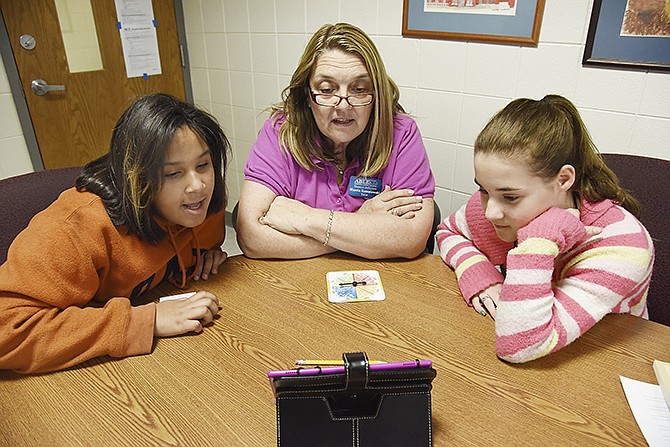Entering middle school is already a tough transition without the struggle of a reading disability.
There are programs that target students who score far below the average. But that leaves a group that falls in the middle, with a reading ability just high enough to get by but low enough to need help.
Those are the students sought out by the Jefferson City middle schools. The schools created a literacy program and partnered with the ABLE Learning Center seven years ago.
ABLE was established in 1985 in Jefferson City to promote literacy in the area. The center provides free one-on-one tutoring for those 16 and older.
"We thought, "Wouldn't it be nice if we could eliminate the need to work with adults by working in middle schools?'" said Donna Johnson, the ABLE board chairman of the middle school project. "The middle school had just started a literacy program and decided that would be a good start. Students coming into an entirely different environment could easily get lost."
Between the two middle schools, volunteer tutors work with 32 sixth-graders once a week for about an hour.
Students are identified as needing extra help after taking the Scholastic Reading Inventory (SRI) test at the beginning of the year.
The literacy program works with those who fell below the proficient level, and uses a one-on-one reading test to discover which reading level they are at and what they need to work on, Johnson said.
When the program first started, sixth-graders read fiction novels because tutors thought it would get them interested in reading, Johnson said.
Now they've made the switch to non-fiction because it's typically what the students are reading in a classroom, she said. Textbooks, for example, are very complex with lots of components. Tutors help students break those down and comprehend what they're reading.
But the program is very individualized.
Tutors are encouraged to get to know their students' interests to better cater to the child's needs.
Karen Distler, literacy coach at Lewis and Clark Middle School, said one of the students really likes cooking and baking, so the tutor incorporated recipes into the reading plan.
"There's a good relationship between the tutor and a student and feeling like they can read," Distler said. "They feel that success when they're with the tutors. In a classroom, sometimes they feel like the other students know the answer and they don't. One on one, they don't have that."
Tutors are also using iPads to keep up with technology.
"It's very important to use technology because that's their world," Johnson said.
ABLE has lent the schools two iPads per building. The tutoring website incorporates articles based on reading levels and videos, which caters to different learners and better captures the attention of students.
Tutors typically work with their students for a year, and the center has seen 88 percent of its middle school students improve. Most of the students reach proficiency or above after retesting on the SRI at the middle or end of the year.
Johnson has seen SRI scores improve by 30 to 340 points.
Robyn Behen, literacy coach at Thomas Jefferson Middle School, said they have thought about carrying the program over to seventh grade, but there aren't enough tutors and the class scheduling is more difficult.
"Students are also more aware of not wanting to be different in seventh grade," Behen said. "No one wants to be singled out or look different."
Many of the tutors are former teachers, Johnson said. They all go through ABLE training to prepare them for tutoring.
"Each volunteer said it's very rewarding," she said.

